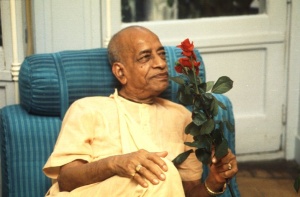SB 1.7.19: Difference between revisions
m (1 revision(s)) |
No edit summary |
||
| Line 1: | Line 1: | ||
{{info | {{info | ||
|speaker= | |speaker=Sūta Gosvāmī | ||
|listener=Sages of | |listener=Sages of Naimiṣāraṇya | ||
}} | }} | ||
[[Category:Srimad-Bhagavatam - Canto 01 Chapter 07]] | |||
[[Category:Bhagavatam Verses Spoken by Suta Gosvami - Vanisource|010719]] | |||
<div style="float:left">'''[[Srimad-Bhagavatam]] - [[SB 1|First Canto]] - [[SB 1.7: The Son of Drona Punished|Chapter 7: The Son of Droṇa Punished]]'''</div> | |||
<div style="float:right">[[File:Go-previous.png|link=SB 1.7.18]] '''[[SB 1.7.18]] - [[SB 1.7.20]]''' [[File:Go-next.png|link=SB 1.7.20]]</div> | |||
{{CompareVersions|SB|1.7.19|SB 1964|SB 1972-77}} | |||
{{RandomImage}} | |||
==== TEXT 19 ==== | ==== TEXT 19 ==== | ||
<div | <div class="verse"> | ||
yadāśaraṇam ātmānam | :yadāśaraṇam ātmānam | ||
aikṣata śrānta-vājinam | :aikṣata śrānta-vājinam | ||
astraṁ brahma-śiro mene | :astraṁ brahma-śiro mene | ||
ātma-trāṇaṁ dvijātmajaḥ | :ātma-trāṇaṁ dvijātmajaḥ | ||
</div> | </div> | ||
| Line 17: | Line 23: | ||
==== SYNONYMS ==== | ==== SYNONYMS ==== | ||
<div | <div class="synonyms"> | ||
''yadā''—when; ''aśaraṇam''—without being alternatively protected; ''ātmānam''—his own self; ''aikṣata''—saw; ''śrānta-vājinam''—the horses being tired; ''astram''—weapon; ''brahma-śiraḥ''—the topmost or ultimate (nuclear); ''mene''—applied; ''ātma-trāṇam''—just to save himself; ''dvija-ātma-jaḥ''—the son of a ''brāhmaṇa.'' | |||
</div> | </div> | ||
| Line 24: | Line 30: | ||
==== TRANSLATION ==== | ==== TRANSLATION ==== | ||
<div | <div class="translation"> | ||
When the son of the brāhmaṇa [Aśvatthāmā] saw that his horses were tired, he considered that there was no alternative for protection outside of his using the ultimate weapon, the brahmāstra [nuclear weapon]. | When the son of the brāhmaṇa [Aśvatthāmā] saw that his horses were tired, he considered that there was no alternative for protection outside of his using the ultimate weapon, the brahmāstra [nuclear weapon]. | ||
</div> | </div> | ||
| Line 31: | Line 37: | ||
==== PURPORT ==== | ==== PURPORT ==== | ||
<div | <div class="purport"> | ||
In the ultimate issue only, when there is no alternative, the nuclear weapon called the brahmāstra is applied. The word dvijātmajaḥ is significant here because Aśvatthāmā, although the son of Droṇācārya, was not exactly a qualified brāhmaṇa. The most intelligent man is called a brāhmaṇa, and it is not a hereditary title. Aśvatthāmā was also formerly called the brahma-bandhu, or the friend of a brāhmaṇa. Being a friend of a brāhmaṇa does not mean that one is a brāhmaṇa by qualification. A friend or son of a brāhmaṇa, when fully qualified, can be called a brāhmaṇa and not otherwise. Since Aśvatthāmā's decision is immature, he is purposely called herein the son of a brāhmaṇa. | In the ultimate issue only, when there is no alternative, the nuclear weapon called the ''brahmāstra'' is applied. The word ''dvijātmajaḥ'' is significant here because Aśvatthāmā, although the son of Droṇācārya, was not exactly a qualified ''brāhmaṇa''. The most intelligent man is called a ''brāhmaṇa'', and it is not a hereditary title. Aśvatthāmā was also formerly called the ''brahma-bandhu'', or the friend of a ''brāhmaṇa''. Being a friend of a ''brāhmaṇa'' does not mean that one is a ''brāhmaṇa'' by qualification. A friend or son of a ''brāhmaṇa'', when fully qualified, can be called a ''brāhmaṇa'' and not otherwise. Since Aśvatthāmā's decision is immature, he is purposely called herein the son of a ''brāhmaṇa''. | ||
</div> | </div> | ||
__NOTOC__ | |||
<div style="float:right; clear:both;">[[File:Go-previous.png|link=SB 1.7.18]] '''[[SB 1.7.18]] - [[SB 1.7.20]]''' [[File:Go-next.png|link=SB 1.7.20]]</div> | |||
__NOTOC__ | |||
__NOEDITSECTION__ | |||
Revision as of 11:17, 30 April 2021

A.C. Bhaktivedanta Swami Prabhupada
TEXT 19
- yadāśaraṇam ātmānam
- aikṣata śrānta-vājinam
- astraṁ brahma-śiro mene
- ātma-trāṇaṁ dvijātmajaḥ
SYNONYMS
yadā—when; aśaraṇam—without being alternatively protected; ātmānam—his own self; aikṣata—saw; śrānta-vājinam—the horses being tired; astram—weapon; brahma-śiraḥ—the topmost or ultimate (nuclear); mene—applied; ātma-trāṇam—just to save himself; dvija-ātma-jaḥ—the son of a brāhmaṇa.
TRANSLATION
When the son of the brāhmaṇa [Aśvatthāmā] saw that his horses were tired, he considered that there was no alternative for protection outside of his using the ultimate weapon, the brahmāstra [nuclear weapon].
PURPORT
In the ultimate issue only, when there is no alternative, the nuclear weapon called the brahmāstra is applied. The word dvijātmajaḥ is significant here because Aśvatthāmā, although the son of Droṇācārya, was not exactly a qualified brāhmaṇa. The most intelligent man is called a brāhmaṇa, and it is not a hereditary title. Aśvatthāmā was also formerly called the brahma-bandhu, or the friend of a brāhmaṇa. Being a friend of a brāhmaṇa does not mean that one is a brāhmaṇa by qualification. A friend or son of a brāhmaṇa, when fully qualified, can be called a brāhmaṇa and not otherwise. Since Aśvatthāmā's decision is immature, he is purposely called herein the son of a brāhmaṇa.